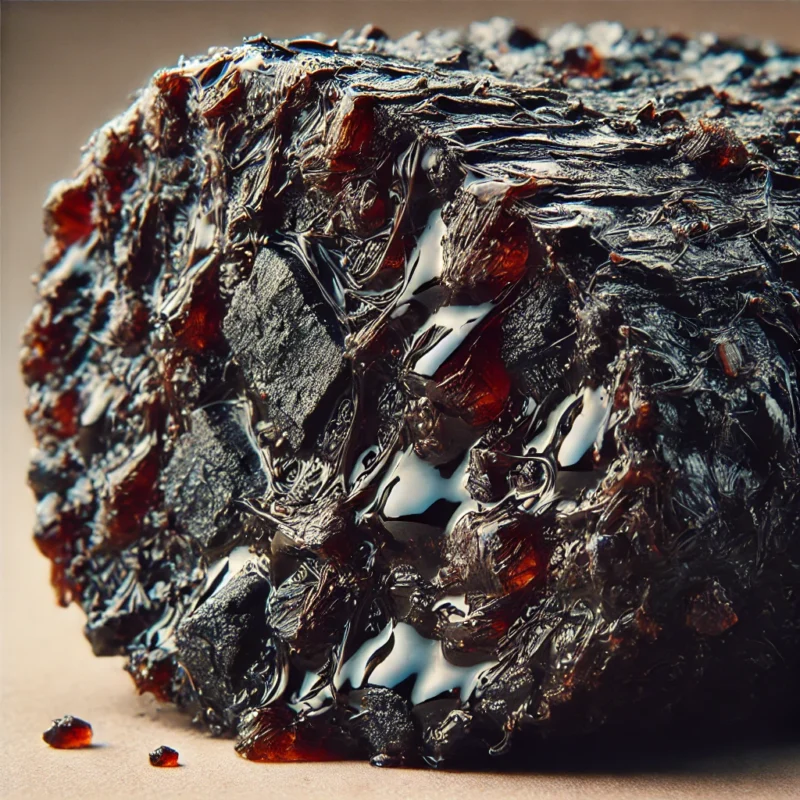I always stay aware of new health research and products that aid in retaining optimal health. I fully subscribe to the narrative that our traditional American diet isn’t that great, so we should be supplementing with vitamins. Many of the foods we eat are very processed and that removes many of the vitamins and minerals. Personally I find myself so busy, and whatever I choose to snack on may not be the healthiest. Lately, I have been seeing a lot of talk about shilajit online. I have seen data that would suggest that this product is good for both men and women, with a plethora of opportunity to treat a multitude of ailments that we may experience. I wrote this article to explore what this product is and to shed light, to make people aware that there are natural alternatives for Issues that their doctor may not present. I have a quite a few friends that are on traditional western medicines, but they experience some side effects that aren’t so great. Therefore, I use my platform to help both my friends and my readers. I hope you enjoy.
Shilajit, an ancient Ayurvedic remedy, has been gaining attention for its potential benefits for women’s health. This natural substance, formed over centuries in the mountains, is packed with minerals and compounds that can have an impact on various aspects of female well-being. You might be curious about how shilajit can support your hormonal balance and overall health.
In this article, you’ll discover the many ways shilajit benefits women. We’ll explore its historical use, its potential to manage PCOS, its effects on mood and mental health, and its role in weight management. You’ll also learn about shilajit’s possible skin health and anti-aging benefits. By the end, you’ll have a clear understanding of how this natural supplement might enhance your health and well-being.
Historical Use of Shilajit in Women’s Health
Ayurvedic Traditions
Shilajit has been a cornerstone in Ayurvedic medicine for centuries, particularly for women’s health. This sticky, tar-like substance, formed over centuries from decomposed plant matter in mountainous regions, has been prized for its rich mineral content and potential health benefits. In Ayurvedic practice, shilajit has been used to address a wide range of women’s health concerns, from menstrual irregularities to fertility issues.
Traditionally, Ayurvedic practitioners have recommended shilajit to help balance hormones in women. They believed it could regulate the menstrual cycle and alleviate symptoms of premenstrual syndrome (PMS). The fulvic acid content in shilajit was thought to play a crucial role in detoxifying the body and reducing inflammation, which could contribute to overall hormonal balance.
Shilajit was also prescribed for its potential to boost energy levels in women. Ayurvedic texts suggest that it helps produce Adenosine-5′-triphosphate (ATP) in the body, providing a natural energy boost that keeps women active and in good spirits throughout the day.
Traditional Chinese Medicine
While shilajit is primarily associated with Ayurveda, it has also found its place in Traditional Chinese Medicine (TCM). In TCM, shilajit was valued for its “warming” properties and its ability to strengthen the body’s vital energy or “Qi.”
Chinese medicine practitioners have used shilajit to support women’s reproductive health. They believed it could enhance fertility by improving blood flow to the reproductive organs and providing essential nutrients. The mineral-rich composition of shilajit was thought to nourish the body and support overall well-being, which was seen as crucial for maintaining reproductive health.
Modern Adaptations
In recent years, there’s been a resurgence of interest in shilajit for women’s health, with modern research exploring its potential benefits. Studies have begun to investigate the claims made in traditional medicine systems, providing some scientific backing to age-old practices.
One area of focus has been shilajit’s potential impact on bone health. As you age, you become more susceptible to conditions like osteoporosis, especially after menopause. Recent research has shown promising results, suggesting that shilajit might promote the differentiation of stem cells into osteoblasts, the cells responsible for bone formation. This could potentially help maintain bone density and overall bone health in women.
Another modern adaptation of shilajit use is in skincare. The fulvic acid in shilajit is now recognized for its antioxidant properties, which may help protect your skin from environmental damage and signs of aging. Some studies suggest that fulvic acid can improve skin hydration, enhance elasticity, and reduce inflammation – all crucial factors in maintaining healthy, youthful-looking skin.
Shilajit is also being explored for its potential to support weight management in women. Some research indicates that it might enhance metabolism and promote the conversion of fats and carbohydrates into energy, potentially aiding in weight control.
Moreover, the adaptogenic properties of shilajit are gaining attention in the context of modern lifestyles. As an adaptogen, shilajit may help your body better manage stress, which is particularly valuable given the multiple roles and responsibilities many women juggle today.
While these modern adaptations of shilajit use are exciting, it’s important to note that research is still ongoing. As with any supplement, you should consult with a healthcare provider before incorporating shilajit into your health regimen, especially if you’re pregnant, breastfeeding, or have any existing health conditions.

Shilajit and PCOS Management
Polycystic Ovary Syndrome (PCOS) is a complex hormonal disorder that affects many women. Shilajit, an ancient Ayurvedic remedy, has shown promise in managing some of the symptoms associated with PCOS. Let’s explore how this natural substance might help you if you’re dealing with PCOS.
Insulin Sensitivity
One of the key issues in PCOS is insulin resistance, which can lead to a host of other problems. Shilajit might be able to help you improve your insulin sensitivity. Here’s how:
- Regulating blood sugar: Shilajit has properties similar to cinnamon, which has been shown to improve insulin selectivity in women with PCOS. The phenolic compounds in these substances can help regulate your blood insulin levels.
- Promoting glucose uptake: These compounds also encourage your body to take up glucose more effectively and synthesize glycogen in the liver. This can help keep your blood sugar levels more stable.
- Reducing oxidative stress: Shilajit’s antioxidant properties may protect against oxidative stress, which can disrupt hormonal balance and contribute to insulin resistance.
By potentially improving your insulin sensitivity, shilajit might help address one of the root causes of PCOS.
Androgen Regulation
Excess androgens (male hormones) are another hallmark of PCOS. Shilajit might have a role to play in regulating these hormone levels:
- Balancing hormones: Shilajit has been found to help regulate the delicate balance of progesterone and estrogen levels. This balancing act might indirectly help in managing androgen levels.
- Reducing testosterone: While shilajit can boost testosterone in men, its effect in women with PCOS might be different. Some herbs used in traditional medicine have shown promise in decreasing testosterone levels in women with PCOS.
- Addressing adipose androgens: Elevated insulin levels can stimulate the release of androgens from fat tissue. By potentially improving insulin sensitivity, shilajit might indirectly help reduce this source of excess androgens.
Ovulation Support
PCOS often leads to irregular menstrual cycles and problems with ovulation. Shilajit might offer some support in this area:
- Regulating menstrual cycles: By supporting your body’s natural hormonal rhythms, shilajit may help alleviate symptoms like irregular menstrual cycles.
- Improving ovarian function: Some herbs with properties similar to shilajit have been shown to reduce the follicular sheath and improve the formation of the corpus luteum, which is crucial for ovulation.
- Balancing hormones for fertility: Shilajit’s potential to balance progesterone and estrogen levels might create a more favorable environment for ovulation and fertility.
It’s important to note that while these potential benefits are promising, more research is needed to fully understand how shilajit affects PCOS. Always consult with your healthcare provider before starting any new supplement regimen, especially if you’re dealing with a complex condition like PCOS.
In addition to shilajit, other natural remedies have shown promise in managing PCOS symptoms. For example, turmeric (curcuminoids) has been found to improve the histological features of polycystic ovaries and support hormone balance. Aloe vera has also shown potential in regulating blood lipid and glucose levels, which can be beneficial in treating PCOS-related metabolic disturbances.
Remember, managing PCOS often requires a multi-faceted approach. While natural remedies like shilajit might be helpful, they should be part of a comprehensive treatment plan that includes a healthy diet, regular exercise, and any medications prescribed by your doctor. By working closely with your healthcare team and exploring various options, you can find the best way to manage your PCOS symptoms and improve your overall health and well-being.
Enhancing Mood and Mental Health
Shilajit, a powerful Ayurvedic remedy, has shown promising effects on mood and mental health. This natural substance contains a rich blend of minerals and compounds that can have an impact on your brain chemistry and overall well-being. Let’s explore how shilajit might help you enhance your mood and support your mental health.
Neurotransmitter Balance
Shilajit has been linked to potential effects on neurotransmitters in your brain, such as dopamine and serotonin. These brain chemicals play a crucial role in regulating your mood and emotions. Here’s how shilajit might help:
- Dopamine boost: Studies have shown that shilajit can increase dopamine levels in the cortico-hippocampal region of your brain, which is associated with learning and memory.
- GABA activation: Shilajit has been found to boost levels of Gamma-aminobutyric acid (GABA), a calming neurotransmitter that can help reduce stress and anxiety.
- Serotonin regulation: By stimulating the Vata and Pitta doshas in your body, shilajit may help keep serotonin levels under control, potentially improving your overall mood.
These effects on neurotransmitter balance can contribute to shilajit’s reported cognitive-enhancing and mood-regulating properties.
Anxiety and Depression
If you’re dealing with anxiety or depression, shilajit might offer some natural support. Here’s how it could help:
- Anxiolytic properties: Shilajit has been shown to have anxiolytic (anti-anxiety) effects, which may help reduce symptoms like nervousness and tension.
- Antidepressant characteristics: The robust antidepressant properties of shilajit can help stabilize your mental condition and reduce both mental and physical stress.
- Stress adaptation: As an adaptogen, shilajit helps your body adapt to stress, promoting a sense of balance and resilience.
- Cortisol regulation: Interestingly, shilajit doesn’t increase or decrease cortisol levels but extends its half-life. This means the normal morning cortisol release might last longer, potentially helping you better manage daily stressors.
Cognitive Function
Shilajit’s benefits extend to overall cognitive function, potentially helping you think more clearly and maintain mental sharpness. Here’s what research suggests:
- Memory enhancement: Shilajit has been found to act as a cognitive and memory enhancer, potentially improving your ability to learn and recall information.
- Neuroprotection: The fulvic acid in shilajit has antioxidant properties that may help protect your brain cells from damage and potentially slow cognitive decline associated with conditions like Alzheimer’s disease.
- Energy production: By enhancing mitochondrial function, shilajit might increase energy production in your brain cells, supporting overall cognitive performance.
- Anti-inflammatory effects: Shilajit’s anti-inflammatory properties could contribute to better brain health by reducing inflammation in neural tissues.
It’s important to note that while these potential benefits are promising, more research is needed to fully understand how shilajit affects mood and mental health. Always consult with your healthcare provider before starting any new supplement regimen, especially if you’re dealing with mental health concerns.
Remember, shilajit is just one piece of the puzzle when it comes to maintaining good mental health. A holistic approach that includes a balanced diet, regular exercise, adequate sleep, and stress management techniques is crucial for overall well-being. Shilajit can be a valuable addition to your mental health toolkit, but it’s not a substitute for professional medical advice or treatment when needed.

Supporting Weight Management
Shilajit, a natural compound rich in fulvic acid and essential minerals, has gained attention for its potential to support weight management. This ancient remedy offers various benefits that can help you achieve and maintain a healthy weight. Let’s explore how shilajit can contribute to your weight management goals.
Metabolic Effects
Shilajit has shown promising effects on metabolism, which plays a crucial role in weight management. Here’s how it can help:
- Increased calorie burning: Studies suggest that shilajit can boost your body’s rate of burning calories. This means it might help your body convert food into energy more efficiently, potentially aiding in weight control.
- Energy production: Shilajit has been found to increase adenosine triphosphate (ATP) availability by improving mitochondrial function. This can lead to enhanced energy levels, making it easier for you to engage in physical activities and maintain an active lifestyle.
- Blood sugar regulation: Recent research has shown that shilajit might help reduce blood sugar levels. By supporting better blood sugar control, it can potentially help prevent weight gain associated with insulin resistance.
Fat Metabolism
Shilajit’s impact on fat metabolism is another aspect that makes it valuable for weight management:
- Cholesterol reduction: Studies have observed that shilajit can decrease serum cholesterol levels. Its major constituent, fulvic acid, contains powerful antioxidants that may help in fat metabolism.
- Triglyceride reduction: Research has shown that shilajit can help lower triglyceride levels. This effect can contribute to better overall lipid profiles and support weight management efforts.
- Prevention of fat accumulation: Shilajit has been found to maintain energy metabolism by preventing the conversion of excess calories into fat. This property can be particularly beneficial if you’re trying to avoid weight gain.
Appetite Regulation
One of the challenges in weight management is controlling appetite and cravings. Shilajit might offer some support in this area:
- Reduced cravings: Some studies suggest that shilajit may help decrease cravings for unhealthy foods, such as processed snacks and sugary treats. This can be particularly helpful if you’re trying to make healthier food choices.
- Improved digestion: Incorporating shilajit into your daily routine might help improve digestion. Better digestion can help your body absorb essential nutrients from food more effectively, potentially reducing the urge to overeat.
- Appetite control: While more research is needed, some evidence suggests that shilajit may help control appetite, potentially reducing overeating and supporting your weight management goals.
It’s important to note that while shilajit shows promise in supporting weight management, it’s not a magic solution. To achieve the best results, you should combine shilajit supplementation with a balanced diet and regular exercise. Always consult with a healthcare professional before adding any new supplement to your routine, especially if you have existing health conditions or are taking medications.
Remember, sustainable weight management is about making long-term lifestyle changes. Shilajit can be a valuable tool in your weight management journey, but it works best when used as part of a comprehensive approach to health and wellness. By combining shilajit’s potential benefits with healthy eating habits and regular physical activity, you can work towards achieving and maintaining a healthy weight in a natural and sustainable way.
Skin Health and Anti-Aging Benefits
Shilajit, a sticky substance found in the rocks of the Himalayas, has gained recognition for its potential skin health and anti-aging benefits. This natural compound, rich in fulvic acid and essential minerals, offers various advantages for your skin. Let’s explore how shilajit can contribute to maintaining a youthful appearance and promoting overall skin health.
Collagen Production
One of the key ways shilajit supports skin health is by promoting collagen production. Collagen is a crucial protein that gives your skin structure and elasticity. As you age, your body’s collagen levels naturally decrease, leading to sagging skin and the appearance of wrinkles. Shilajit can help combat these signs of aging in several ways:
- Encouraging synthesis: Shilajit stimulates collagen synthesis, helping to maintain skin elasticity and minimize the signs of aging.
- Providing essential nutrients: The mineral-rich composition of shilajit supplies vital nutrients that support collagen production and overall skin health.
- Enhancing cellular repair: Shilajit contains fulvic acid, which has been shown to aid in cellular repair and regeneration. This can help your skin cells become more effective at self-healing, reducing the appearance of fine lines and wrinkles.
Antioxidant Effects
Shilajit’s powerful antioxidant properties play a significant role in protecting your skin from damage and supporting its overall health. Here’s how shilajit’s antioxidant effects benefit your skin:
- Fighting oxidative stress: The fulvic acid in shilajit acts as a potent antioxidant, helping to combat oxidative stress by eliminating harmful toxins and free radicals. This can slow down the onset of aging effects on your skin.
- Protecting cellular structures: By scavenging damaging free radicals, shilajit helps protect your body’s proteins, cells, and DNA from damage over time.
- Enhancing nutrient absorption: The unique structure of fulvic acid in shilajit boosts the absorption of essential nutrients and minerals by your cells, supporting overall skin health.
- Improving skin rejuvenation: Shilajit’s antioxidant properties contribute to skin rejuvenation by promoting cellular repair and renewal.
Hormonal Acne
Hormonal acne is a common skin concern, especially for women in early adulthood or during menopause. Shilajit may offer some support in managing hormonal acne:
- Balancing hormone levels: Shilajit contains zinc and selenium, which are known to help balance hormone levels while regulating oil secretions. This can be beneficial in managing hormonal acne.
- Anti-inflammatory properties: The anti-inflammatory effects of shilajit may help reduce the inflammation associated with acne breakouts.
- Detoxification: Shilajit’s ability to detoxify your body by removing toxins can contribute to clearer skin and potentially reduce acne breakouts.
- Stress reduction: Stress and acne are closely related. Shilajit’s adaptogenic properties may help your body better manage stress, potentially reducing stress-induced acne flare-ups.
It’s important to note that while shilajit shows promise in supporting skin health and anti-aging, more research is needed to fully understand its effects. A study on middle-aged women supplemented with shilajit showed induction of microvascular and extracellular matrix mechanisms, suggesting potential benefits for skin health. However, it’s always best to consult with a healthcare professional before incorporating any new supplement into your skincare routine.
In addition to its skin benefits, shilajit may also have positive effects on overall health. It has been found to improve mitochondrial activity, which can help fight fatigue and bring back a youthful sense of vigor by increasing energy production. Some research also suggests that shilajit’s bioactive ingredients may enhance brain function by reducing oxidative stress and boosting the generation of neurotransmitters, potentially improving memory, concentration, and cognitive clarity.
Remember, while shilajit can be a valuable addition to your skincare regimen, it works best when combined with a healthy lifestyle, including a balanced diet, regular exercise, and proper skincare practices. By incorporating shilajit along with these healthy habits, you can work towards achieving and maintaining healthy, youthful-looking skin.
In Conclusion
Shilajit has proven to be a versatile natural remedy with a wide range of benefits for women’s health. From its historical roots in Ayurvedic and Traditional Chinese Medicine to its modern applications, this mineral-rich substance has shown promise in managing PCOS, enhancing mood and mental health, supporting weight management, and promoting skin health. Its ability to balance hormones, regulate insulin sensitivity, and provide antioxidant effects makes it a valuable tool to consider for overall well-being.
As research continues to uncover the potential of shilajit, it’s clear that this ancient remedy has a place in modern health practices. While it’s not a magic solution, incorporating shilajit into a healthy lifestyle can contribute to improved hormonal balance, better mood, and a more youthful appearance. Want to know more about shilajit? Click here to learn more. As with any supplement, it’s crucial to consult with a healthcare professional before adding shilajit to your routine, especially if you have existing health conditions or are taking medications.
FAQs
Can Shilajit assist in balancing female hormones?
Yes, Shilajit is beneficial for women as it aids in regulating the balance between progesterone and estrogen levels. This can help in reducing symptoms associated with hormonal imbalances such as irregular periods, mood fluctuations, and hot flashes.
Who should refrain from using Shilajit?
Individuals with conditions like sickle cell anemia, hemochromatosis (excessive iron in the blood), or thalassemia should avoid Shilajit. Additionally, if you experience allergic reactions such as rashes, increased heart rate, or dizziness after taking Shilajit, it’s advisable to discontinue its use immediately.
How should Shilajit be used to promote weight loss?
To utilize Shilajit for weight loss, a daily intake of 300 to 500 grams is recommended, preferably on an empty stomach. Shilajit helps enhance metabolism, aiding the body in burning excess fat accumulated from unhealthy diets, aging, or other factors.
Does Shilajit have detoxifying effects on the body?
Yes, Shilajit is recognized for its detoxifying benefits, mainly due to its high fulvic acid content. It can help eliminate toxins and heavy metals from the body, mitigating the impacts of environmental pollutants.












